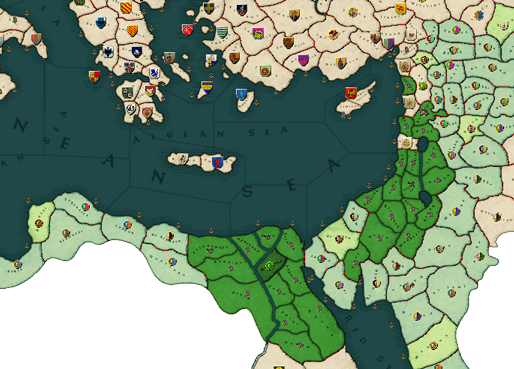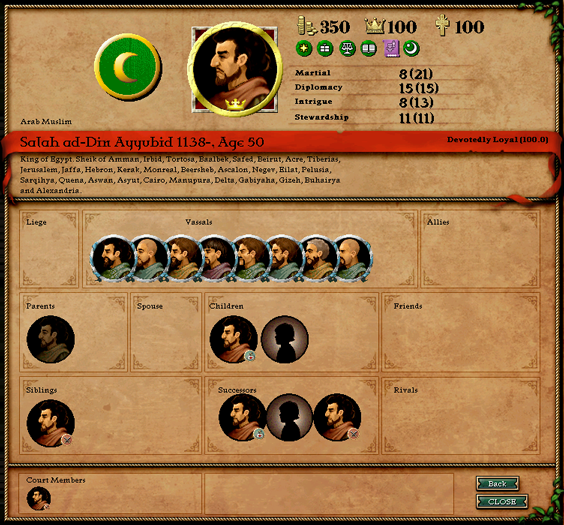[size=+1]Genetics[/size]:
The beginning of this lecture will serve to establish the reasoning behind the more practical second half. As it will be concerned with sex, however, those of you who are adolescent or exceptionally chaste or lustful are welcome to wait in the student lounge with Alys and the other women. Those participating via correspondence are likewise welcome to skip ahead to the next section.
Genetics is the study of the origins of life, and while it is customarily most concerned with animal husbandry, it has applications in government and law as well, particularly those laws governing probate and succession.
The Authorities tell us (and investigation at
the Salernitan Medical School confirms) women have all the same parts as men, only inside rather than outside. Thus, scientists have long followed
Hippocrates and
Galen in their supposition that children are formed by the mixing of male and female semen during
coitus. Women's hidden testes are drier, colder, and less developed than men's, and so they taught the female seed forms undigested and incomplete. While insisting upon the existence and contribution of female semen to conception, the Hippocratic school was thus forced to concede that — even if such sperm exists — it serves principally as food for the male, except in the cases of the weakest and most effeminate children.
The Philosopher's
De generatione animalium has long been known to oppose this view, but it was not until this decade that cutting-edge research at SMS finally secured a Latin translation of the original. (This is a must-have for any modern library, and available from the University scriptorium with or without our school's famed illuminations.)
In this text, the Philosopher explains how his close and careful examinations of the natural world have established a number of flaws in the Hippocratic model. In the first place, female sexual excretions are not produced from their
cryptorchid testicles. They flow instead from hidden sweat glands, seeking to remain cool and dry in the presence of close masculine force. Second, he proves that children are formed not out of a tissue of a residual coital slime, but from a slow coägulation of the stomach's menstrual blood in the uterus. Galen's report that the fetus consumes the menstruum as its nourishment is rejected as untenable, given the separate presence and source of the umbilical cord. Last and most damning,
he clearly shows how a model allowing women as fully complete men capable of the emission of generative seed inevitably allows virgin birth not as a singular miracle but (
horribile dictu) as a natural and common occurrence in
exceptionally sanguine women. For if the only distinction to be made between men and women or between their respective seed is the heat of the refining fire, then natural variation of the species must allow that some most excellent women — particularly in the act of coitus — approach or surpass the most infirm
and choleric men. The ability of the latter to breed then tends to support the ability in the former. Such a doctrine allows that virgin births should have occurred innumerable times in the past, should occur even now, should continue to occur innumerable times again until
the Day of Judgment.
Inter alia, the consequences of this pernicious mistake touching the Holy Mother are too terrific to contemplate.
Victory in this rivalry must finally be granted to the Philosopher, whose conception — that the male seed imparts the vitality and form but not the material of the child to come — comports not only with observable facts but also with Holy Writ and the Incarnation.
The effect of such learning upon the laws of inheritance should be obvious.
All men living derive their form from one of the sons of
Noah Hen, but
agnates share one another's form
much more closely. Regardless of their name or station, they are one's true dynasty.
Therefore, the wise king should always favor succession exclusively through his male relatives, however distant.
The earliest Romans, being closest to true philosophy, followed just this practice, which they described as agnatic. It is now (less felicitously) known as
Salic succession, after Pope St. Damian's imperfect understanding of Frankish law (and also political considerations,
v.i.)
As codified
in Title LIX of
King Clovis's Lex Salica, it was customary for the Salians to exclude women from their inheritance of
ancestral land and to exclude daughters from any inheritance whatsoever. However, this happy state of affairs lasted less than fifty years before
the first King Chilperic — more concerned with his royal dignity than with the blood royal — annulled it, providing that in the absence of surviving male heirs of the body daughters and their heirs should have full rights to a patrimony. This mirrored the corruption and decadence of the Roman Republic and Empire, which saw the Galenic error grow more popular and common until it found expression in
the Justinian Code's cognatic inheritance, reckoned from and to male and female alike.
Cognatic inheritance is distinct from St. Damian's
Semi-Salic succession, though, since the latter bars the female from direct inheritance in her own right (or her husband's inheritance on her behalf.) Instead, St. Damian allowed inheritance only to pass
through the mother to her male children, ia. Although this course of succession is defective for the reasons explained above, it remains widespread for many reasons. Under no circumstance should you ever disabuse
other lords from its practice. As we will see later in this course,
Semi-Salic inheritance is the surest and commonest cause of the elevation of new dynasties to high rank.
Partible inheritance is the division of an estate among all eligible heirs. It was
the general practice of the ancient Hebrews. It remains the common practice of all mankind from the Pillars of Hercules to Alexander's Gate, utmost Thule to highest Ethiopia, and is typically the justest manner by which a man might deal with his children. Its application to the state, however, is productive of such innumerable evils that Pope St. Damian took great pains to eliminate its practice.
The first was to rechristen it. Previously, from its widespread Frankish use, it had been often designated
"Salic inheritance" or "Salic patrimony" and carried a great deal of prestige. St. Damian helped end this with
Ad alienos. There, he used "Salic inheritance" to mean agnatic succession, and Salic inheritance he instead calls "Gavelkind."
This strange English term (
whose original meaning and etymology both have no relation at all to its current use) helped render it more unfashionable on the Continent and among the British.
It was also made more unworkable by appeal to divine guidance. Whereas previously, all sons inherited together directly or by representation,
Ad alienos provided that
deceased heirs were to be considered condemned of God. Their descendants were barred from any share of inheritance prior to the extinction of all preceding classes of heirs. At each tier (in order: sons and each generation of their descendants, fathers and each generation of their descendants, grandfathers and each generation of their descendants, &c,) a single survivor meant a completely unitary succession. Likewise, although previously heirs might divide up the land in council together or the youngest heir might divide the land while his elders chose among the parcels,
Ad alienos provided that the eldest surviving heir should always receive the primary title. After that, the titles are granted in turn. The actual lands are divided into parcels by the appropriate bishop or archbishops and lots drawn for each. This division and distribution is made without regard to any ducal or royal titles, adjoining property, or contiguity.
Finally, the papacy has worked actively against practitioners of gavelkind. On the death of
Henry III, Pope St. Damian refused outright to recognize
further kingdoms within France and Germany. He assisted the Capetian kings in erecting
their appanage system. France's conquest of Saxon England
was supported,
as was the later Anglo-French conquest of Ireland, until at the present day it remains in force only in regions lost to
the Eastern Heresy: Bosnia, Serbia, Bulgaria,
Ruthenia. Similarly, gavelkind inheritance was previously
the sole method of succession among the Mahometans, whose heresiarch specially provided for it among his writings. Their taste for fratricide and civil discord waning, it is now continued only by the Ayyubid Caliphate in Egypt.
This is the current demesne of the Ayyubid state:






